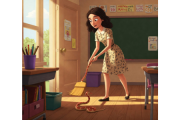Quinta Tecka had a smaller side balcony off my parents’ master bedroom, and in the early morning and late evening we could hear the soft cooing of the pigeons who lived on its roof. This second floor contained four bedrooms each at a corner of the house, each on both sides separated by a bathroom between them. One of these was our playroom, and the one at the front was the communal bedroom for all three boys. Air conditioning was not needed in Caracas, but the house had been built with a wide, spacious tiled floor leading from the staircase to the front balcony to facilitate the movement of fresh air through the upper story. Under the stairs was a tiny bathroom with a little crank-operated window that looked out onto an enclosed patio open to the sky. Here my baby brother had his playpen, which had to be moved to follow the shade, as the sun, beating fiercely down, moved across a cloudless sky. On one side of the patio was the maid’s quarters, a bedroom and bathroom. I have a dim memory of my father evicting a male visitor from the maid’s bedroom one night. The maid followed the next day, and the room was then left untenanted, with a series of daily maids taking her place.
My mother was frugal and house-proud: she had taken her grammar-school training in ‘domestic science’ seriously, and insisted on a high degree of competence and efficiency. The maids she liked best needed little direction, and could even be induced to prepare English meals, such as rissoles, shepherd’s pie, and roast beef (lomito at the carniceria, or butcher’s) with Yorkshire pudding, but Mum usually preferred to do her own cooking in the enormous two-roomed kitchen with its huge larder. She was resolutely English in her meal choices, (“never American food!”) and we never had home-made hallacas, arepas, or platanos. She was shocked to learn that some of my father’s colleagues dined out once a week. “How extravagant!” was a frequent comment. Flanking the front door was a sitting-room with room for my mother’s baby grand piano, and a formal dining-room. Most of our furniture was English, much of it second-hand. A long driveway led to a garage behind the patio. Dad drove home at noon from the Shell building in San Bernardino and a school bus brought us home for the day’s main meal that Mum prepared for all of us: fish cakes, meatloaf, ‘mince,’ pork chops, or bacon and beans, complete with egg custard, lemon soufflé, or apple pie for dessert, all home-made. The bus drove us back to school after lunch. We must have had the privilege of long lunch hours, no doubt born of the Spanish tradition of the noon-time siesta. In the school holidays, our mid-morning snack was always what now seems a curious combination, of Florida orange juice and Ritz crackers. Supper was usually a light meal such as soft-boiled eggs with bread-and-butter ‘soldiers’ or tinned salmon with cucumbers. You could not drink tap water: it had to be boiled daily and stored in metal canisters to cool on the counter. It was heartbreaking for my brothers and me to empty our mother’s Ottawa house, when, at the age of ninety, she was persuaded to move to a retirement home in Toronto, and all of her carefully-maintained kitchen goods had to be dispersed or disposed of : her trusty Spong mincer, her pressure cooker, saucepans, and the like, all that had seen lifelong service on three continents, but objects of greater sentimental value, such as the tea canister she had acquired to mark the Queen’s Coronation in 1953, with the faded portrait of Her Majesty on one side and Prince Philip on the other, battered with 60 years’ daily use, were saved, as were the photos, souvenirs, and art work of our time in her beloved Caracas.




